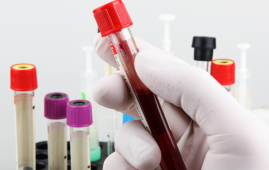

Research by Neeraj Agarwal, MD, called TALAPRO-2 showed that taking TALZENNA along with XTANDI can lower the risk of mortality or disease progression related to prostate cancer by 37%. At the American Society of Clinical Oncology Genitourinary Cancers Conference last month, Agarwal, who holds the Presidential Endowed Chair of Cancer Research at the Huntsman Cancer Center, gave a presentation on the findings of one of his numerous Phase III trials.
Prostate cancer is the most prevalent cancer and the second highest cause of cancer death in males in the United States, according to the National Cancer Institute. Prostate cancer that is advanced and resistant to androgen blocking is known as castration-resistant prostate cancer or CRPC.
To treat metastatic prostate cancer, TALAPRO-2 combines the two oral medicines TALZENNA and XTANDI. The experiment examines the efficacy of combining TALZENNA with the commonly prescribed androgen receptor blocker XTANDI, which stops male hormones from fueling the tumor. A PARP inhibitor called TALZENNA is frequently used to treat breast cancer.
Each participant’s treatment plan in the overall trial had a randomly chosen course of action. While some patients received the two medications together, others received the usual dosage of XTANDI and a placebo. The clinical trials team at the Huntsman Cancer Center was crucial in keeping track of the patients who were registered at the facility. All Phase III trials must compare side effects and outcomes between the two groups as a crucial component.
“As a physician, I want my patients to be able to enjoy life while being treated for cancer,” says Agarwal. “Clinical trials help us find better cancer treatments with fewer side effects. Those who are impacted by cancer can have hope that their treatment is constantly improving.
Phase III trials are the last phase before the FDA can approve a new treatment. The FDA decision on this investigatory drug combination is expected in 2023.
more recommended stories
 New Blood Cancer Model Unveils Drug Resistance
New Blood Cancer Model Unveils Drug ResistanceNew Lab Model Reveals Gene Mutation.
 Osteoarthritis Genetics Study Uncovers New Treatment Hope
Osteoarthritis Genetics Study Uncovers New Treatment HopeOsteoarthritis- the world’s leading cause of.
 Antibody Breakthrough in Whooping Cough Vaccine
Antibody Breakthrough in Whooping Cough VaccineWhooping cough vaccine development is entering.
 Scientists Unveil Next-Gen Eye-Tracking with Unmatched Precision
Scientists Unveil Next-Gen Eye-Tracking with Unmatched PrecisionEye-tracking technology has long been a.
 Men5CV: Hope for Ending Africa’s Meningitis Epidemics
Men5CV: Hope for Ending Africa’s Meningitis EpidemicsA landmark global health study led.
 Stem Cell Therapy Shows 92% Success in Corneal Repair
Stem Cell Therapy Shows 92% Success in Corneal RepairA groundbreaking stem cell therapy known.
 Gene Therapy for Maple Syrup Urine Disease
Gene Therapy for Maple Syrup Urine DiseaseResearchers at UMass Chan Medical School.
 How Fast Are Your Organs Aging? Simple Blood Test May Tell
How Fast Are Your Organs Aging? Simple Blood Test May TellNew research from University College London.
 HEALEY Platform Accelerates ALS Therapy Research
HEALEY Platform Accelerates ALS Therapy ResearchA New Era of ALS Clinical.
 Low-Oxygen Therapy in a HypoxyStat Pill? Scientists Say It’s Possible
Low-Oxygen Therapy in a HypoxyStat Pill? Scientists Say It’s PossibleA New Approach to Oxygen Regulation-HypoxyStat.

Leave a Comment